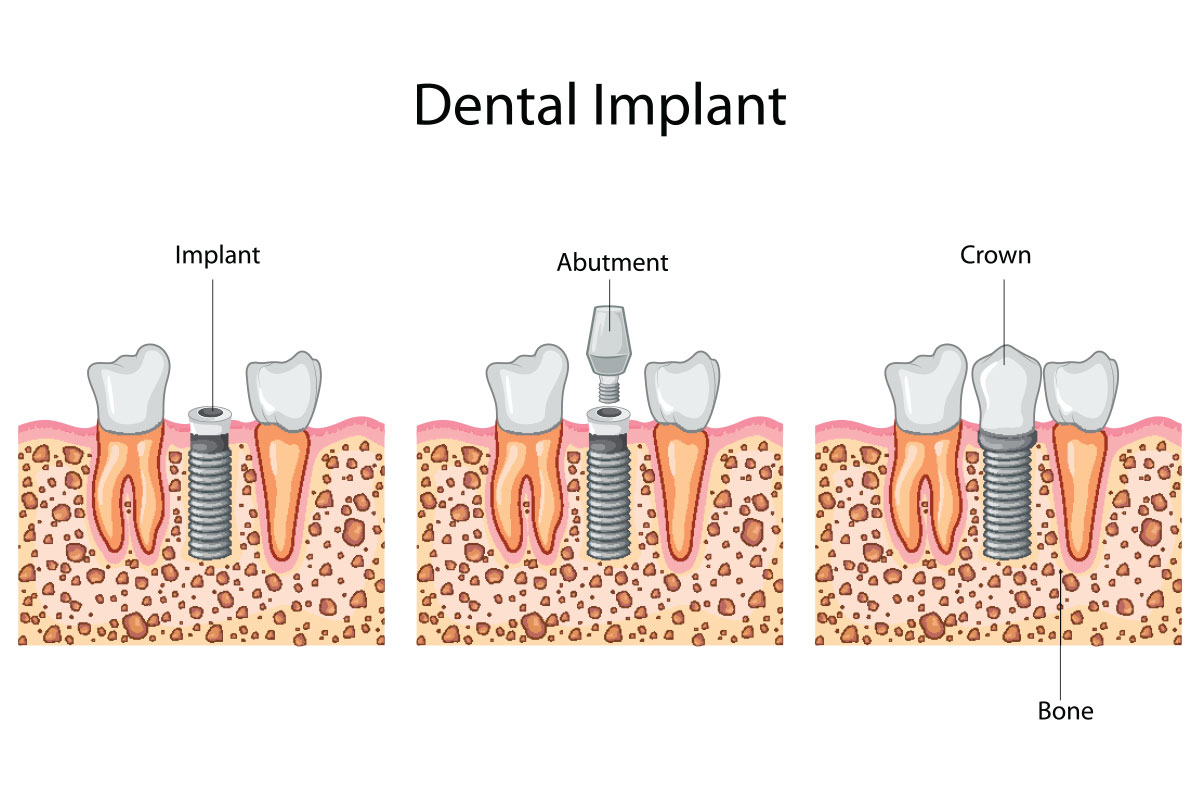What are dental implants?
Dental implants are designed as a permanent treatment to fill a gap left by a missing or extracted tooth and restore full functionality and natural appearance.
It’s important to fill the gaps present in one’s mouth with a tooth or multiple teeth because adjacent teeth can move, leading to crookedness and even more gaps in the long term.
Leaving a gap in your mouth can also alter the shape of your face and lead to sacrificed muscular support and in turn, premature ageing.
A high quality dental implant can help to maintain your muscles, as well as jawbone density, which can also improve the appearance of your jaw. It also makes dental hygiene far easier for your remaining natural teeth.
What is the cost of dental implants?
At City Smiles we are committed to providing affordable dental care for our patients. The prices we offer are extremely competitive in comparison to other dental practices.
- Implant Crowns $1600 each
- Implant Surgery $1850 per fixture (Implant Fixture Placement)
- Full Dental Implant $3750 per tooth (Fixture + Crown)

City Smiles have a range of payment options to help patients cover the costs of dental treatments. This allows you to receive the dental treatment you need without having to sacrifice your financial stability.
Considerations
Every surgical or invasive procedure has risks involved. We will discuss the risks of the procedure during your consultation as well as examine your health to ensure you are an ideal candidate for a surgical procedure.
This will involve analysing the health of your mouth and body to minimise the risk of complications during the course of your treatment plan.
The dental implant procedure
The first step of your surgery will be inserting a titanium dental implant into your jawbone, which will act as the artificial root for your new tooth. This implant will take a few months to heal and for the jawbone to fuse itself.
Once the implant is fused to the bone, the implant will be covered by a dental crown.
We refer to these two parts as the fixture (implant) and restoration (crown).
The fixture will ensure stability, while the restoration will ensure function and a highly desirable cosmetic appearance.
Healing and recovery after dental implants
Once the dental implant surgery is completed and the tooth implant has been placed into your jawbone, you will need to let it heal and fuse with the bone; a process known as Osseointegration. It may take up to around 6 months for the implant to fully integrate into your jaw bone.
Once healed and bonded, your implant acts as a structural base for the crown, essentially working in the same way that the root of a natural, healthy tooth would.
Side-effects of a dental implant
You may experience slight discomfort immediately after your implant surgery such as:
- Swelling
- Bruising
- Pain
- Minor bleeding
These symptoms can be easily treated with general medications and antibiotics as prescribed by your oral surgeon.
Frequently Asked Questions about Dental Implants
Why replace a lost tooth?
A lost tooth or teeth will not only affect the appearance of your smile. There are several repercussions on your overall dental and oral health. Some of the most significant effects include:
- Bone resorption – the jawbone will naturally begin to shrink due to lost stimulation from the missing natural tooth. Eventually affecting external facial appearance and leading to a raft of other debilitating symptoms, such as the degradation of attaching ligaments and muscles and temporomandibular disorder.
- Bite malalignment – neighbouring teeth shift to attempt to cover the gap left by a missing tooth. This causes crookedness and occlusion malalignment, leading to reduced function and increased risk of developing gum disease as teeth become difficult to efficiently clean.
Replacing a lost tooth with a dental implant helps to mitigate potential consequences and is beneficial for oral health. A dental implant consists of an artificial tooth root, made of biocompatible titanium, which is surgically inserted to the jawbone. Eventually, the bone integrates with the implant, creating a strong and sturdy artificial tooth root. After this stage, an implant crown (the visible ‘tooth’), bridge or denture can be attached to the root.
How much do Dental Implants cost at City Smiles Melbourne?
The philosophy at City Smiles is affordability and care, combined with quality dental treatments. The general cost of implant dentistry consists of implant fixture placement, at $1750 per fixture, and an implant crown for $1550 each. The price may vary depending on your individual case. During your consultation, we will provide you with a final quote.
While the initial costs may seem quite high, it is likely to be cheaper in the long run compared to other restorative efforts (such as bridges or dentures). Dental implants are long lasting and one of the few methods that truly counteract the negative effects of tooth loss. Bridges and dentures may seem like a cheaper option but will incur further maintenance costs over time.
We have a range of payment options including our dental payment plans. This allows you to receive the dental treatment you need without having to sacrifice your financial stability.
What are the 3 stages of dental implants?
The three stages of dental implant treatment are as follows:
- Implant Placement: In this stage, the dental implant is surgically placed into the jawbone. The implant is typically made of titanium and resembles a small screw. Once the implant is placed, a healing period of several months is required to allow the implant to fuse with the surrounding bone tissue in a process called osseointegration.
- Abutment Placement: After the implant has fused with the jawbone, an abutment is placed on top of the implant. The abutment serves as a connection point for the prosthetic tooth or teeth that will be attached to the implant.
- Prosthetic Placement: The final stage involves placing the prosthetic tooth or teeth onto the abutment. This may involve attaching a single crown, bridge, or denture to the implant, depending on the patient’s specific dental needs.
It’s important to note that the timeline for each stage can vary depending on individual circumstances and healing time.
How long after dental implants can I eat normally?
Following dental implant surgery, it’s advisable to stick to a soft food diet for the first few days to promote proper healing. As the healing process progresses, harder foods can gradually be reintroduced, but it’s crucial to avoid biting or chewing directly on the implant site until it’s fully healed, which may take a few months. Additionally, maintaining good oral hygiene habits is important during the healing process.
Is the dental implant procedure painful?
The dental implant procedure itself is typically performed under local anaesthesia, so you should not feel any pain or discomfort during the surgery. However, like any surgical procedure, you may experience some discomfort and soreness afterward, which can be managed with over-the-counter pain relievers or prescription medication prescribed by your dentist.
The level of pain or discomfort you may experience during the recovery period can vary depending on factors such as the extent of the surgery, your individual pain tolerance, and how well you follow your dentist’s post-operative instructions. It’s common to experience some swelling, bruising, and sensitivity in the implant area, but these symptoms should subside within a few days to a week.
Overall, whilst there may be some discomfort associated with the dental implant procedure and recovery, it is usually manageable and well worth the long-term benefits of a restored smile and improved dental health.
Who is a good candidate for dental implants?
Ideal candidates for dental implants are individuals with healthy gums, sufficient bone density, good oral hygiene, and general good health. Adults with fully developed jawbones and non-smokers tend to be more suitable candidates. Children, smokers, or those with specific health issues might not be the best candidates. Consulting a dental professional is crucial to assessing whether dental implants are appropriate.
How long do dental implants last?
Dental implants can endure for many years, frequently spanning decades or a lifetime with appropriate care. Their durability relies on maintaining good oral hygiene, undergoing regular dental check-ups, and maintaining overall health. The crown part of the implant generally needs replacement every 10 to 15 years due to wear and tear. Additionally, the implant’s lifespan can be influenced by its placement in the mouth and lifestyle factors such as smoking.
What are the best practices for a successful dental implant?
Here are some of the best practices for ensuring a successful dental implant:
- Consultation and Planning: Begin with a thorough consultation with your dentist or oral surgeon. This involves assessing your oral health, discussing treatment options, and creating a personalised treatment plan.
- Choosing an Experienced Professional: Select a skilled and experienced implant dentist or oral surgeon who is proficient in dental implant procedures. Their expertise significantly impacts the success and longevity of your implant.
- Healthy Gums and Bone: Ensure your gums and underlying bones are in good health. If necessary, treatments like bone grafting or gum disease therapy may be recommended to improve the implant’s foundation.
- Precision in Placement: Implant placement is critical. Utilising advanced imaging technology like CT scans helps in precisely positioning the implant for optimal function and aesthetics.
- Quality of Materials: High-quality implants and components, typically made from titanium or ceramic, contribute to long-term durability and biocompatibility.
- Proper Oral Hygiene: Maintain excellent oral hygiene before and after implant placement. This includes regular brushing, flossing, and professional dental cleanings to prevent infections and ensure the longevity of the implant.
- Follow-Up Care: Attend all follow-up appointments as scheduled. This allows your dentist to monitor healing, assess the implant’s integration with your jawbone, and address any concerns promptly.
- Lifestyle Considerations: Avoid habits like smoking, which can compromise healing and increase the risk of implant failure. Additionally, protect your implant from excessive force or trauma, such as teeth grinding or clenching.
- Regular Dental Check-Ups: Continue regular dental visits for ongoing maintenance and monitoring of your dental implant’s health and function.
By following these best practices, you can maximise the success rate and longevity of your dental implant, restoring both function and confidence in your smile.
Dental Implants Melbourne CBD
If you have suffered tooth or teeth loss, dental trauma or have a decayed tooth, you may want to restore the tooth with a single implant or replacement tooth. The dental implant treatment is the closest permanent option to a natural tooth that is currently available. If you are interested in having a dental implant, please speak to the team at City Smiles in Melbourne.
Ask a Question or Book an Appointment
Please fill in the online enquiry form to ask a question or book an appointment. We look forward to seeing you soon.


